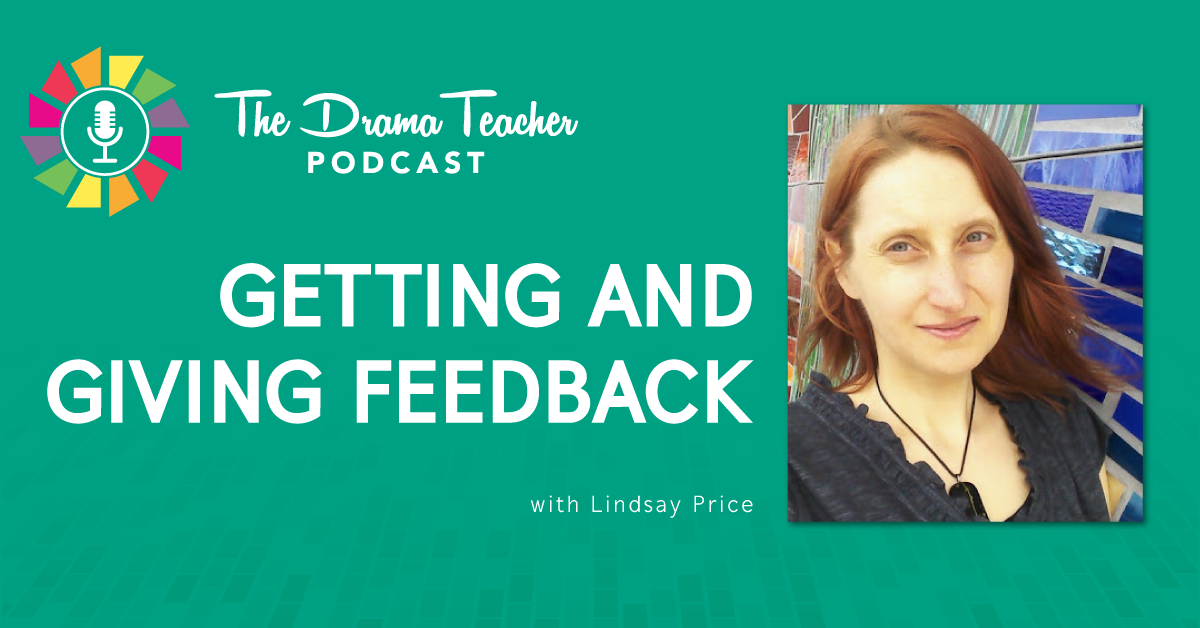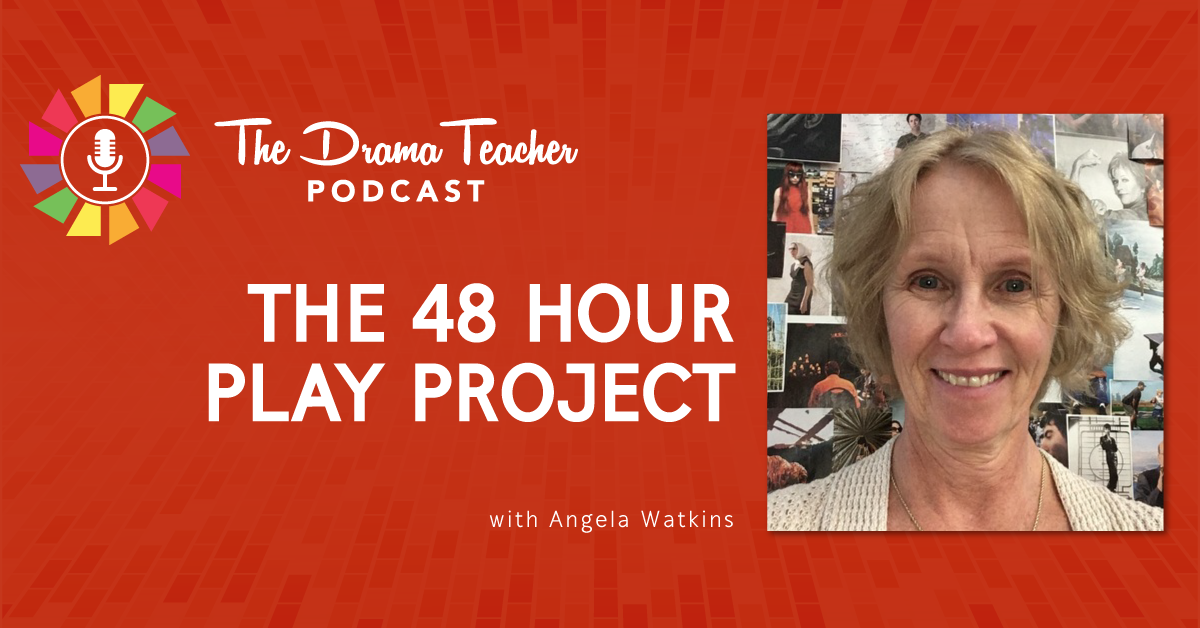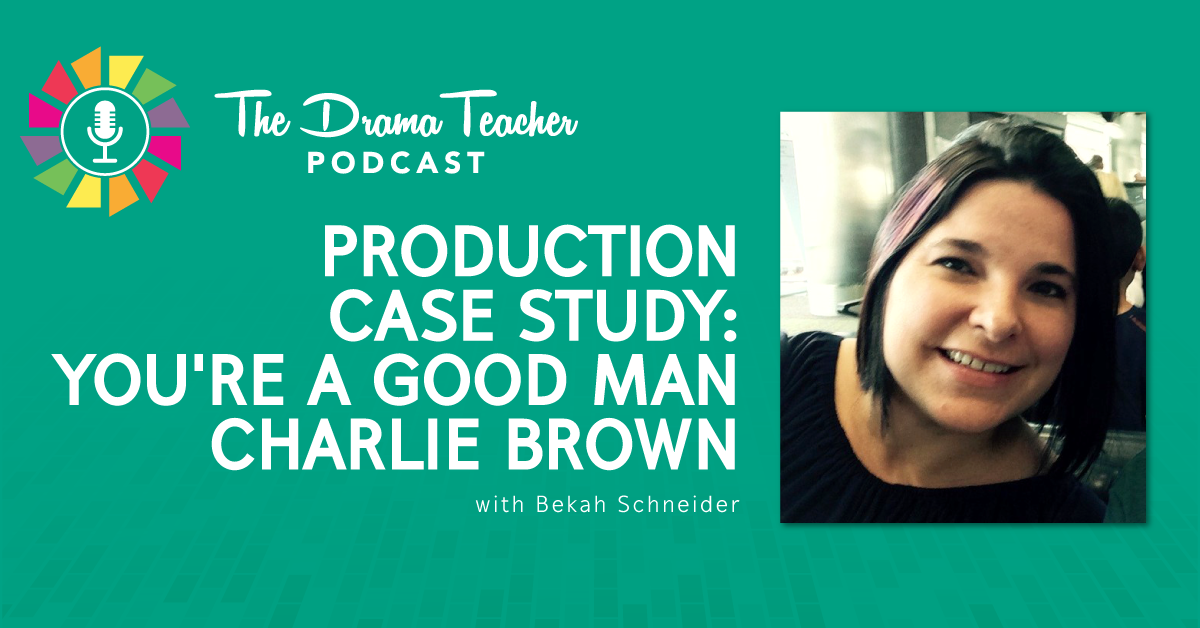Getting and Giving Feedback
Episode 35: Getting and Giving Feedback
It’s necessary. It’s evil. It’s a necessary evil. Oh no not really, but there certainly is an art and a skill to giving and getting constructive feedback in the arts. Just so you know, telling Lindsay you don’t like her work is like having a piece of her soul ripped away. Oh no not really. Ok, yes really.
Show Notes
Lindsay’s three rules of getting feedback
- One : Write it all down.
- Two : Never address the feedback in the moment.
- Three : Always wait a week before re-visiting what you wrote down.
Time and time again I have written down someone’s feedback and in my head said, “This is the stupidest thing I ever heard.” And a week later I look at it again and go, “Crap. They’re right.” Happens all the time. Distance is important in accepting help. These steps work for me, maybe they’ll work for you.
Subscribe to The Theatrefolk Podcast
Episode Transcript
Welcome to TFP, the Theatrefolk podcast. I am Lindsay Price, resident playwright for Theatrefolk.
Hello! I hope you’re well. Thanks for listening.
Today, we’re going to talk about getting and giving feedback. But first let’s do some THEATREFOLK NEWS.
The catalogue is coming! The catalogue is coming! It’s Spring and that means we have sprung a new catalogue. Like that? Like that? Pretty snazzy, huh? Check out our theatre teacher resources. Check out our free resources. Check out our new plays! Check out plays that are new to you. It’s all in one tidy, sweet-smelling – if you like the smell of paper and I do – package. You can also download our new catalogue on our website, or if you want to hold the actual thing, drop us a line and we’ll send you one for free. We want you to have whatever access to our products and/or services that works the best for you.
Lastly, where, oh, where can you find this podcast? We post new episodes every Wednesday at theatrefolk.com and on our Facebook page and Twitter. You can find us on the Stitcher app AND you can subscribe to TFP on iTunes. All you have to do is search on the word “Theatrefolk.”
Episode Thirty-Five: Getting and Giving Feedback
It’s necessary. It’s evil. It’s a necessary evil. There is an art and a skill to giving constructive feedback and getting that feedback, and I think that’s especially true in the arts. It’s more personal in the arts, mostly because for many the expression “of the arts” is personal. And we’d like to say, you know, we’d all like to say there is a separation between artist and the art, but I don’t know. I think it’s kind of bogus. It’s kind of a lie, right? My art, it comes from me. It comes from inside of me. It comes from my brain, is written by my fingers. It is an expression of me. It’s my voice, you know? My art is me! And I don’t think in a creepy way. I hope not.
Okay, so, because the instant I say something like that, I get a very creepy vision of that eccentric writer with long, flowing scarf and tuberculosis, sitting in a garret, smoking, looking into the distance and saying, “My art is me….” That’s not me and I think it’s because I’m too practical – I’ve said this before. I’m too practical to be creepy. I hope I’m too practical to be creepy. But I’m very much okay with saying my art comes from me and therefore it is very personal. I have to be okay about that because it’s true.
Okay, back on track. What are we talking about? Feedback, yes! Okay. I take feedback personally because to me art is personal. And I actually feel a little sad for artists who don’t view their art as personal. That feels really cold to me, doing art like a desk job, like an accountant which now means I’m being unfair to accountants. You know, maybe they take numbers very, very personally. Maybe they see numbers the same way that I see words. Why not? You know?
Or maybe I’m the sad one. Maybe I should be able to make that separation between art and artist. I should be able to not take feedback personally for that particular reason, except for the fact that I have tried to do that sometimes. I have tried to write on projects that I had no personal attachment to and projects that I didn’t particularly like – just did for the money. And frankly, every one turned out to be a Disaster – capital D – to the point that it was damaging to me as a person, as a human being, and responsible for a long standing Diet Coke addiction. So, I don’t do it anymore. I can’t do it so it is all personal to me.
My art is personal. And that whole notion of that separation, you know? I get asked quite a lot, you know, “Why don’t you want to go to Hollywood? Why don’t you want to be a screenwriter?” And that’s why! Because I couldn’t! For good or for ill, because I’m attached to my work and the thought of someone coming in and changing my work, and not necessarily for the good of my work, but, you know? Writing by a committee and having someone else in charge of the words that come out of me. Yup, yup, I know very well that I would hate every last second of it, every last drop. It would be that damaging.
So, okay, what are we talking about? Feedback! Okay, so, some people are good at giving and receiving feedback, and some people are not, and I’m including both, right? There are people who are good at giving and also good at getting just as there are people who are not good at giving and they really suck at getting.
I work really hard when I have to give feedback, mostly because I’m not that great at getting. When I write something that is going to be given to another writer, I always have to ask myself, “Would I be okay with getting this?” Obviously, I cannot predetermine what someone’s reaction is going to be because we all react differently. We’re all at different, different levels in terms of how we perceive feedback. But I have to say, “Would I be okay with getting this?”
I know feedback is necessary. I know it and know that a play does not exist in a vacuum and I know that, if there is no feedback, there is no growth. End of story. End of sentence. Period. It has to happen. And I am better than I used to be. But, the truth of the matter is, even after – I can’t come up with a number in my head – after a very long time that I have been doing this, still, still, getting some bad feedback on one of my plays is like a piece of my soul dying. It is like a little bit of my soul just gets ripped away and floats off and it takes me a very long time to recover. So, see, there you go. See, I say that I’m better than I used to be but maybe that is a complete lie.
So, enough about that, let’s start with the giving, the giving of feedback. And the problem is, is that those who give feedback, they fall into some categories. So, here’s two categories that they first fall into – that people are either very flippant with their feedback or they’re very intense with their feedback. You know? “Yeah, well, who cares, right? I didn’t really care about it.” Or, “If you don’t make these changes, your entire life will explode.” That was my intense voice. And both of these attitudes, both of these extremes are really bad for giving feedback.
The person that you’re giving feedback to, they do want you to care but not too little and not too much because then it becomes about the person giving rather than the person getting. It becomes more about an attitude than the actual words, the actual feedback. That’s key, right? It should always be about the feedback. So, if you’re giving feedback a good question for you to think about is: What is my attitude? Why do I have this attitude? And, what’s the purpose of it? If you’re presenting feedback in an overly intense manner, why? And specifically, why is it important to deliver the feedback this way? How does it help? Is being overly casual actually helping? And, it doesn’t matter if this is your general attitude with the world. “Oh, that’s how I am, man.” That’s not good enough. So what? You’re not helping. You’re thinking about yourself and not the person that you’re talking to.
A couple of other categories, you know, some people, when they give feedback, either they are much too much into being that person, being that feedback giver, and what I mean by being that person is that, when the feedback giver, when the person in question didn’t actually ask for it. They just give feedback, you know, willy-nilly all the time. And then, the opposite side of that is someone who is so afraid of giving feedback, they’re so afraid of saying anything negative that they don’t do anything useful. It’s completely un-useful. They love everything you do. “Oh, it’s great! It’s great! Oh, it’s so nice!” Nice is not helpful. If you tell someone that everything sucks, that’s not helpful either. Giving feedback that wasn’t asked, not helpful, right?
There are two types of these feedback givers – these wasn’t asked for givers. The inappropriate timers and the you-should-do-this-ers. “Oh, you should do this. You should change this. It would be way better if you did this. I know better, do this.” Hey! Guess what? You’re not the person doing the work. You don’t get a say in how the work gets done, especially if your opinion wasn’t asked for. That’s not the point in giving feedback to put your thumb in the wet cement, to put your stamp on the work, to say, “I know better. Do this,” right? That is not the point. But these feedbackers actually bother me way, way less than the inappropriate timers.
For me, feedback is, really, it’s all about timing. Timing is everything. I have a very specific process for when I want feedback and how I want it. I’ll get to that in the getting feedback section. But, for me, there is nothing worse than sitting through a show and either feeling wonderful or feeling that there’s something still not quite right about the script and mulling that over and having someone come up to me right afterwards and tell me something about the play that I did not ask for. Even if I know they’re right, even if I know their feedback is valid, it’s a timing issue. That’s not the time and I didn’t ask for it, right?
There was a show, oh, a long time ago now, and I was not feeling… I was feeling unsettled, very unsettled about the script and I was feeling so frustrating and I was sitting there and Craig turned to me and he verbalized exactly what I was thinking and I had to leave the theatre, immediately. I went to the cast and I gave my apologies and I, basically, ran to the car because I was going to burst into tears and then did. And I did not have nice things to say about the timing of Craig’s feedback. And it’s just the same thing. Even if I know that the feedback is right, I’m just not ready to hear. I’m not ready to process, and if I’m not ready to process then the feedback just meshes into the ether and it isn’t as helpful in moving things forward.
Now, I am a big girl. And I know that, sometimes, I need to get feedback at an inappropriate time. Sometimes, when I get that feeling – that frustration – sometimes, I will come out and I will ask a direct question and I will fully expect the direct answer whether or not it’s a good one, whether or not it’s going to make me feel good, and whether or not it’s something I want to hear, I will deal with it. The difference there is that I asked for it, and if I ask for something, I have to take whatever it is that I get.
When I was working on the play Backspace which just came out and we got to the end of a, oh, it was a great, great workshop week. It really went well and the play at the time was still a full-length – it’s not now, ugh, for these particular reasons – and there was just something off. I could sense it. And even though it really was an inappropriate time because it was just at the end of all this intense work, I full-on asked the director her thoughts because I knew it, I could sense it. I could sense her hesitation and I had to get that feedback slap in the face. And she gave it to me and I took it. I asked for it and I had to take it. In general though, if I don’t ask you, I’m not looking for your comments. They’re not going to help, I’m not going to react well, and that’s the thing. There it is. The word that I keep repeating over and over and over again – feedback is help.
It’s all about helping. If you are being asked to give feedback, you are being asked to be a helper person and help is important. It’s meaningful. We need it. We need the help. When you are presented with the opportunity to give feedback, I think it’s okay to say, “I don’t think I’m going to be helpful.” You know? Instead of saying to someone, “Oh, I don’t want to read your work. Oh, I don’t want to do it. It’s going to be awful, I know.” Just say, “I’m not good at giving feedback. I don’t know how to be helpful.” Say it. Don’t get trapped into giving feedback if you don’t want to. It’s okay to say no. Just say no but that’s a really good way to frame it because, if you’re not going to be helpful then the person who’s, you know, trying to get you to give feedback, they should, they should back away because they should know that that’s what the point of feedback is – to be helpful.
So, what is helpful? Likes and dislikes – not helpful. They are intangible. “I hate such and such a plot point. I didn’t like it.” Well, guess what? I like it so we’re at a stand-off and the work isn’t moving forward. I think even likes aren’t pretty intangible, you know? “Oh, I liked it so much!” “Okay. Well, what did you like about it, specifically?” “Oh, I just liked everything. Everything was so great!” That’s really a red flag. Even though that’s what we want, all we want is to have our work liked and, you know, for it be wonderful and for everything to be great. But, if a person can’t be specific with what they like, how do you know what’s working, really? How do you know what’s staying with an audience?
So, instead of likes and dislikes, when I’m looking for feedback from someone, I really ask them to focus on impressions and in questions. So, instead of saying what they liked, I get them to say what stayed with them. What impression stayed in the brain after the show was over? And, if nothing is sticking, that’s a problem. That’s something you can address.
Instead of saying, “I don’t like this,” focus on asking questions. “Why does Jimmy burn the letter?
instead of, “I didn’t like it when Jimmy burned the letter.” The first is something concrete, something tangible that can be addressed. And that’s not to say that you, the writer, or you, the artist, has to answer every question. You know, maybe the answer is already in the work and it was missed by the person who you’re getting the feedback from
And here’s a great question for you you-should-do-this feedbackers, instead of saying, “This should happen, I think you should do this,” ask it in the form of a question. “What would happen if Jimmy saved the letter instead of burning it?” That’s something I can address. That’s something I can consider. I’m not necessarily going to change it, you know? “Oh, maybe, well, you know what? It’s really important to the character.” Or, you know, “He burns the letter because of what so and so says.” It doesn’t matter but it means that it’s something that can be addressed.
And, in terms of getting feedback, I really do think that getting feedback is just as difficult as giving. Sometimes, case in point, Lindsay crying in a car after what a loved one – a loved one, not a stranger, a loved one – said to her about a play. And it all circles around to that personal thing. The work comes from me and, if someone attacked it, even if that is just a perceived attack, I’m going to take it personally. But again, and again, and again, and again, it is vital. It is necessary. Am I trying to convince myself here? It is very, very necessary to get feedback and to get it well.
Theatre is a genre which only happens live, that means live people – because dead people, they’re not very helpful – live people are instantly responding to what’s happening on stage. So, if you don’t get some feedback during the process. You may miss something important. You may miss a problem or a hole. Sometimes, you know, the process isn’t working, and getting feedback, getting an outside eye can untie a knot in your process like nobody’s business. Feedback is good for artists like Brussels sprouts. Ha! Except I actually like Brussels sprouts, so there! Aha! I am great at getting feedback.
Okay. So, how do you get feedback without acting like a baby or crying? Just like giving feedback has to be helpful, we artists – me – we have to accept the help. I know a lot of writers who refuse to do that. They will refuse to accept help. They know what’s good, they know what’s right, screw everyone else. It makes you very vulnerable to accept help. So, how do you do it?
This is what I do. So, this is what works for me. One, write it all down. Two, never address the feedback in the moment – that is so huge. Three, wait about a week before you re-visit what you’ve written down. Time and time again, I have written down somebody’s feedback and, in my head, I’m saying, “This is stupid. This is the stupidest thing I’ve ever heard.” And a week later, I will look at it and go, “Oh, they’re right. They’re right.” It happens all the time! It’s too emotional. It’s too present to address feedback right away. You know, let it sit, you’ve got to let it gel. You’ve got to let your brain get to a place where it’s ready – I know that sounds really artsy-fartsy but it’s really true.
You need to give a little bit of distance to approach the feedback in the most effective and efficient manner and that’s what it’s really all about, right? If the feedback isn’t going to be helpful for you then it’s useless. So, you need to get yourself in a head where it’s going to be effective and efficient for you.
I know writers who don’t do this at all. I know writers who say, “You know, give it to me. Be hard. I can take it. Be rough.” Oh, it makes me wince. I don’t like that. I don’t like the notion that feedback has to be rough. I don’t know how rough is helpful. But that’s me and that’s only me. What works for, you know, Bob, isn’t going to work for Sue. Everyone is different, but you do have to know what works for you and you do have to develop a process for receiving help, for receiving feedback because, if you don’t, you know, if you do act out like bursting into tears after somebody tells you something, or pouting, or you know, having this very emotional overreaction every time somebody gives you some feedback, well, people are going to stop helping you. They’re going to stop giving you feedback and then you’ll be left alone in a vacuum – just you and your work. This is where I cue the howling wind and the creaky branches. Now, that’s creepy. That is creepy.
Okay, I think have talked, I have talked enough today. Well, I thought this was going to be a short one but apparently not. So, to recap, help is the keyword. It’s all about the help – being helpful, being able to receive help without being a whiny, why-don’t-you-like-me baby. All of this is about how do we move forward? How do we move work towards completion? And getting our work out there in the world, and that is what we all want, right?
And that’s where we’re going to end. Take care, my friends. Take care.
Music credit: “Ave” by Alex (feat. Morusque) is licensed under a Creative Commons license.



